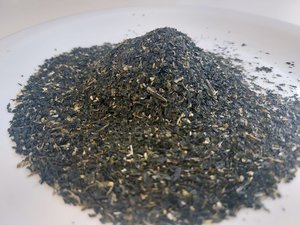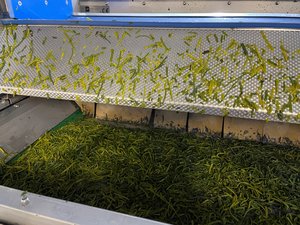Zoute Teelten in Yerseke
2022-09-28
Early October we’re going to Yerseke to see the new logistic center of the Dutch Seaweed Group (DSG). DSG is establishing this center within the project “Zoute Teelten” to process sea vegetables and saline cultivated vegetables. The project is subsidized by the Province of Zeeland and is executed by Dutch Seaweed Group, Murre Technologies, SeaweedTech and North Sea Farmers. The project partners will discuss the current status and results of the new mechanised drying machine and show it to involved parties. In the logistic centre, a variety of vegetables grown in saline environments are processed, like seaweed, sea lavender, common glasswort, potatoes, carrots and cabbage. The machine automatically washes, cuts, blanches, cools, dries and stores, according to the preferred end-product.
The demonstration project, which started in 2021, aims at realizing a publicly accessible logistics center in Yerseke, where Zeeland entrepreneurs can have their locally grown sea vegetables processed in a cost-efficient and large-scale manner. The capacity of the system is now estimated at 3,000 kg. product per day (wet weight). Strengthening the local knowledge and innovation is an important area of attention for the Zeeland agrifood and aquaculture sector. Not only to strengthen the competitiveness of these sectors, but also to ensure the transition to a future-proof and more sustainable business.
Themes such as sustainable soil management, water management, climate-adaptive capacity, reducing the negative effects of business operations on nature and the environment, as well as the positive effect of cultivation activities on biodiversity are central. We as NSF applaud the project, because it is an important step in the innovative value chain of sea vegetables, which can help all market parties in Zeeland but also beyond. With this project, the province of Zeeland has shown that it’s capitalizing on the opportunities offered by sea vegetables for local industry. This development also brings the opportunities for large-scale cultivation of seaweed at sea in wind farms in the North Sea closer, because the lack of large-scale processing facilities was one of the bottlenecks.
Sea vegetables are a source of proteins and vitamins, which can play an important role in the protein transition, improving public health and making food production more sustainable. The market is developing strongly and demand is only expected to increase further in the coming years. Salt crops can be grown in Zeeland all year round. This means that there can be a continuous supply to the logistics center. The harvesting months of the various crops differ considerably (on average two months of harvesting time), which means that the processing of different salt-containing products can in principle be combined well.
More information about the Zoute Teelten project at Iris Menger (iris@northseafarmers.org) and the Dutch Seaweed Group (Sjaak Smeins via sjaaks@dutchseaweedgroup.com).




